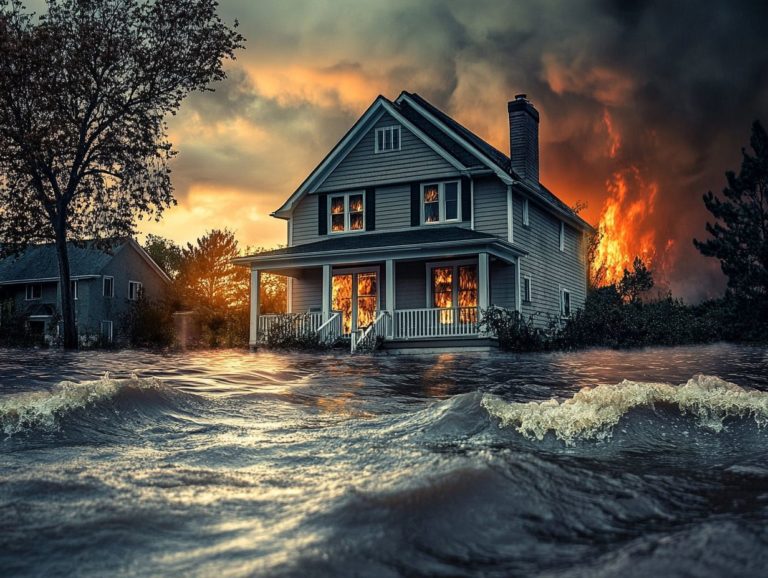5 Essential Considerations for Home Insurance Policies
Navigating the world of home insurance can seem daunting, but grasping the essentials transforms the experience into something much more manageable and rewarding.
From understanding the different types of policies to evaluating your home s value and identifying potential risks, this discussion highlights five crucial considerations that every homeowner should keep in mind.
You ll also discover how to compare quotes, why regular policy reviews matter, and effective tips for saving on premiums.
Continue reading to arm yourself with the knowledge necessary to protect your home with confidence!
Contents
- Key Takeaways:
- 1. Understanding the Different Types of Home Insurance Policies
- 2. Assessing Your Home’s Value and Coverage Needs
- 3. Identifying Potential Risks and Coverage Gaps
- 4. Comparing Quotes from Multiple Insurance Providers
- 5. Reviewing and Updating Your Policy Regularly
- What Are the Key Benefits of Having Home Insurance?
- Frequently Asked Questions
- What are the five essential considerations for home insurance policies?
- What types of coverage should I look for in a home insurance policy?
- How do coverage limits affect my home insurance policy?
- What is a deductible?
- How are premiums determined for home insurance policies?
- What are exclusions in a home insurance policy?
Key Takeaways:

- Understand the different types of home insurance policies to determine the best coverage for your specific needs.
- Regularly assess the value of your home and review your coverage to ensure it adequately protects against potential risks and gaps.
- Compare quotes from multiple insurance providers to find the most affordable and comprehensive policy for your home.
1. Understanding the Different Types of Home Insurance Policies
Understanding the various types of home insurance policies available is crucial for homeowners. To make informed decisions, consider these 5 things to know before buying home insurance. Each policy type offers distinct levels of financial protection against specific risks tied to natural disasters, property damage, and personal liability.
Familiarizing yourself with homeowners insurance options including basic homeowner s insurance (HO-1), broad homeowner s insurance (HO-2), and comprehensive homeowner s insurance (HO-3) helps you make an informed decision that aligns with your coverage needs.
For example, HO-3 is one of the most sought-after choices, delivering comprehensive coverage for both your dwelling and personal belongings. However, it typically excludes certain risks like flood and earthquake damage.
On the other hand, HO-4, commonly referred to as renter’s insurance, is designed for those who don t own the structure but still wish to protect their personal property.
If you have high-value assets, you might find HO-5 particularly advantageous, as it offers broader coverage with fewer exclusions. Keep in mind that top considerations for home insurance types can vary significantly among insurance providers, underscoring the need to compare policies.
Ultimately, selecting the right coverage is essential to ensure you have adequate protection tailored specifically to your needs.
2. Assessing Your Home’s Value and Coverage Needs
Assessing your home’s value and determining your coverage needs are pivotal steps in selecting the right homeowners insurance policy. Understanding the factors influencing home insurance choices ensures that you enjoy adequate financial protection for your property and personal belongings.
With numerous variables at play such as current market trends and unique features of your home it s essential to evaluate both market value and any enhancements that might increase desirability, like renovations or energy-efficient installations.
Understanding dwelling coverage is imperative; it guarantees that the structure of your home is protected with a coverage amount that accurately reflects its replacement cost.
Craft a detailed inventory of your personal property to ensure coverage. Include all valuable items, from electronics to jewelry. Keep in mind that many mortgage lenders may have specific coverage requirements that you need to meet.
Align your policy with both your personal needs and those of your lender. Ready to find the best insurance for your home? Let s get started!
3. Identifying Potential Risks and Coverage Gaps
Identifying risks and coverage gaps in your homeowners insurance is crucial for protecting yourself from unexpected events. This ensures that you have the right protection, including essential riders for your home insurance, for natural disasters, responsibility problems, and damage to your home.
You may not be aware of specific threats, like floods that can damage your basement or earthquakes that can harm your home’s structure. Consider specialized coverage options, such as flood and earthquake insurance, for tailored protection.
To achieve full protection, review your liability coverage thoroughly. Identify gaps that could leave you vulnerable if an accident happens on your property.
4. Comparing Quotes from Multiple Insurance Providers

Comparing quotes from different insurance providers is vital for homeowners looking for the best coverage at competitive rates. To make an informed choice, consider these 5 tips for selecting home insurance types. This helps ensure you have financial protection for your home and belongings.
Request estimates from at least three to five companies. While average costs are important, remember that coverage options can vary widely between policies.
Insurance agents are valuable resources. They can help clarify terms and uncover discounts you might miss on your own.
When evaluating coverages, such as liability and personal property protection, you can find the policy that fits your unique needs, ensuring peace of mind for you and your family.
5. Reviewing and Updating Your Policy Regularly
Regularly reviewing your homeowners insurance policy is key to making sure your coverage aligns with changes in your home and lifestyle. To ensure you’re well-informed, consider the 5 must-ask questions about your home policy, which can provide adequate protection against unforeseen events.
It’s especially important to review your policy after major renovations, like upgrading your kitchen or during life changes, such as marriage or having a child.
These life events can affect your coverage needs. New features may increase replacement costs, while changes in family dynamics might require different protections.
Consider adding additional coverage tailored to your unique circumstances. This ensures robust and comprehensive security.
What Are the Key Benefits of Having Home Insurance?
Homeowners insurance offers vital benefits, providing comprehensive financial protection against property damage and personal liability. It gives you peace of mind against unexpected events, like natural disasters.
This insurance usually includes dwelling coverage, which helps repair or rebuild your home after damage from storms, fires, or vandalism. For instance, imagine facing repairs after a storm damages your roof insurance can ease the burden of those unexpected costs.
Personal property coverage also protects your belongings, ensuring valuable items like electronics and jewelry are safe from theft or disasters.
Liability protection shields you from financial loss if accidents happen, like a guest slipping and falling on your property.
With these coverage options, you can face life s uncertainties with greater confidence and security.
What Are the Common Exclusions in Home Insurance Policies?
Homeowners insurance often excludes critical coverage. Natural disasters like floods and earthquakes usually require separate policies.
This is because standard insurance generally covers theft, fire, and vandalism but not certain catastrophic events.
For instance, water damage from floods or damage from earthquakes is often excluded. It s smart to consider additional policies for these risks.
Understanding these exclusions is vital. Discovering gaps in your coverage during a crisis can lead to significant financial loss.
How Can Homeowners Save on Their Insurance Premiums?

Homeowners can reduce insurance premiums by utilizing discounts and making smart home maintenance choices.
Bundling home and auto insurance can lead to substantial savings. Improving home security, like installing smoke detectors or security cameras, can also lower premiums.
Keeping a clean claims history is just as important. If you go years without filing a claim, you may receive loyalty discounts.
Some insurers offer up to 25% off for proactive steps to protect your home. This makes it easier to safeguard your finances.
What Are the Steps to File a Home Insurance Claim?
Filing a home insurance claim effectively is crucial to getting the compensation you deserve.
Start by documenting any damage thoroughly. Take clear photos and write notes about the incident to support your claim.
Contact your insurance company quickly to report the loss. Know how much your policy covers and any applicable deductibles.
When speaking with claims adjusters, provide clear information. Stay polite and ask questions if you need clarification.
What Are the Factors That Affect Home Insurance Rates?
Your home insurance rates depend on several key factors.
These include your property s risk assessment and specific features of your home, along with your claims history.
For instance, if your home is in a flood-prone area, it may have higher premiums. Features like pools or wood-burning stoves can also increase rates.
Maintaining a clean claims history is essential. Frequent claims can lead to higher premiums, while a spotless record may open doors for discounts.
What Are the Essential Documents to Have for Home Insurance?
Keeping your essential documents organized is crucial for managing your homeowners insurance. This ensures your policy meets your coverage needs.
Store important documents like your insurance policy, home inventory, and any extra coverage details. This helps prevent stress during tough times.
Regularly update your documents to reflect renovations or new possessions. Keeping them easily accessible, either physically or digitally, is essential for quick action.
A well-maintained record collection simplifies the claims process. This allows you to make informed decisions about your coverage.
Frequently Asked Questions

What are the five essential considerations for home insurance policies?
The five essential considerations are coverage types, coverage limits, deductibles, premiums, and exclusions. Understanding these essentials of a good home insurance policy significantly impacts your home insurance protection and costs.
What types of coverage should I look for in a home insurance policy?
The three main types of coverage are dwelling coverage, personal property coverage, and liability coverage. These protect your home, belongings, and finances against unexpected events like natural disasters, theft, or accidents.
How do coverage limits affect my home insurance policy?
Coverage limits set the maximum amount your insurance provider will pay for a claim. It’s vital to choose limits that provide enough protection for your home and belongings.
What is a deductible?
A deductible is the amount you pay before your insurance starts covering costs. A higher deductible may lower your premium, but ensure you have enough savings to cover this cost in case of a claim.
Premiums are based on factors like the location and age of your home, the coverage limits you choose, and your claims history. It’s essential to shop around and compare quotes, especially considering 5 key points about home insurance for new owners, to find the best premium.
What are exclusions in a home insurance policy?
Exclusions are specific events or types of damage your policy does not cover. Common exclusions include floods, earthquakes, and acts of war or terrorism. Review your policy’s exclusions carefully and consider additional coverage for gaps in protection.






